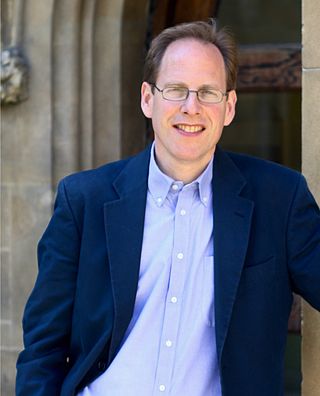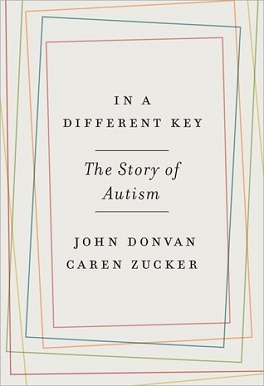
Mary Temple Grandin is an American academic and animal behaviorist. She is a prominent proponent of the humane treatment of livestock for slaughter and the author of more than 60 scientific papers on animal behavior. Grandin is a consultant to the livestock industry, where she offers advice on animal behavior, and is also an autism spokesperson.

Diagnoses of autism have become more frequent since the 1980s, which has led to various controversies about both the cause of autism and the nature of the diagnoses themselves. Whether autism has mainly a genetic or developmental cause, and the degree of coincidence between autism and intellectual disability, are all matters of current scientific controversy as well as inquiry. There is also more sociopolitical debate as to whether autism should be considered a disability on its own.

Sir Simon Philip Baron-Cohen is a British clinical psychologist and professor of developmental psychopathology at the University of Cambridge. He is the director of the university's Autism Research Centre and a Fellow of Trinity College.

Neurodiversity is a framework for understanding human brain function and mental illness. It argues that diversity in human cognition is normal and that some conditions classified as mental disorders are differences and disabilities that are not necessarily pathological.

The autism rights movement, also known as the autistic acceptance movement, is a social movement allied with disability rights that emphasizes a neurodiversity paradigm, viewing autism as a disability with variations in the human brain rather than as a disease to be cured. The movement advocates for several goals, including greater acceptance of autistic traits and behaviors; reforms of services - i.e. services that focus on improving quality of life and well-being instead of suppression and masking of autistic traits that are adaptive or not harmful or imitations of social behaviors of allistic (non-autistic) peers ; the creation of social networks and events that allow autistic people to socialize on their own terms; and the recognition of the autistic community as a minority group.
Ole Ivar Løvaas was a Norwegian-American clinical psychologist and professor at the University of California, Los Angeles. He is most well known for his research on what is now called applied behavior analysis (ABA) to teach autistic children through prompts, modeling, and positive reinforcement. The therapy is also noted for its use of aversives (punishment) to reduce undesired behavior, however these are now used less commonly than in the past.

Autism Network International (ANI) is an advocacy organization run by and for autistic people. ANI's principles involve the anti-cure perspective, the perspective that there should not be a goal to "cure" people of autism.

Manuel F. Casanova is the SmartState Endowed Chair in Childhood Neurotherapeutics and a professor of Biomedical Sciences at the University of South Carolina School of Medicine Greenville. He is a former Gottfried and Gisela Kolb Endowed Chair in Outpatient Psychiatry and a Professor of Anatomical Sciences and Neurobiology at the University of Louisville.

Societal and cultural aspects of autism or sociology of autism come into play with recognition of autism, approaches to its support services and therapies, and how autism affects the definition of personhood. The autistic community is divided primarily into two camps; the autism rights movement and the Pathology paradigm. The pathology paradigm advocates for supporting research into therapies, treatments, and/or a cure to help minimize or remove autistic traits, seeing treatment as vital to help individuals with autism, while the neurodiversity movement believes autism should be seen as a different way of being and advocates against a cure and interventions that focus on normalization, seeing it as trying to exterminate autistic people and their individuality. Both are controversial in autism communities and advocacy which has led to significant infighting between these two camps. While the dominant paradigm is the pathology paradigm and is followed largely by autism research and scientific communities, the neurodiversity movement is highly popular among most autistic people, within autism advocacy, autism rights organizations, and related neurodiversity approaches have been rapidly growing and applied in the autism research field in the last few years.

Johann Friedrich Karl Asperger was an Austrian physician. Noted for his early studies on atypical neurology, specifically in children, he is the namesake of the autism spectrum disorder Asperger syndrome. He wrote more than 300 publications on psychological disorders that posthumously acquired international renown in the 1980s. His diagnosis of autism, which he termed "autistic psychopathy", also garnered controversy. Further controversy arose during the late 2010s over allegations that Asperger referred children to a Nazi German clinic responsible for murdering disabled patients, although his knowledge and involvement remains unknown.

Alexander Plank is an American autism advocate, filmmaker and actor. He is known for founding the online community Wrong Planet, working on FX's television series The Bridge, and acting on The Good Doctor. At the age of 9, Plank was diagnosed with Asperger syndrome. Plank started Wrong Planet at the age of 17 in order to find others like him on the Internet. After the popularity of Wrong Planet grew, Plank began to be frequently mentioned in the mainstream media in articles relating to autism, Asperger's, and autism rights.
Autism spectrum disorders (ASDs) or autism spectrum conditions (ASCs) describe a range of conditions classified as neurodevelopmental disorders in the DSM-5, used by the American Psychiatric Association. As with many neurodivergent people and conditions, the popular image of autistic people and autism itself is often based on inaccurate media representations. Additionally, media about autism may promote pseudoscience such as vaccine denial or facilitated communication.
Gunilla Gerland is a Swedish author and lecturer on the topic of autism. Her written works include Secrets to Success for Professionals in the Autism Field: An Insider's Guide to Understanding the Autism Spectrum, the Environment and Your Role and her autobiography A Real Person: Life on the Outside.

Julia Bascom is an American autism rights activist. She is the current executive director of the Autistic Self Advocacy Network (ASAN) and replaced Ari Ne'eman as president of ASAN in early 2017.

NeuroTribes: The Legacy of Autism and the Future of Neurodiversity is a book by Steve Silberman that discusses autism and neurodiversity from historic, scientific, and advocacy-based perspectives. Neurotribes was awarded the Samuel Johnson Prize in 2015, and has received wide acclaim from both the scientific and the popular press. It was named to a number of "best books of 2015" lists, including The New York Times Book Review and The Guardian.

In a Different Key: The Story of Autism is a 2016 non-fiction book by John Donvan and Caren Zucker. It discusses the history of autism and autism advocacy, including issues such as the Refrigerator mother theory and the possibility of an autism epidemic. Donald Triplett, perhaps the first person diagnosed with autism, and psychiatrist Leo Kanner are also covered, as is the ongoing debate concerning the neurodiversity movement, especially with respect to autistic people with more apparent support needs.

Loving Lampposts is a 2010 documentary film directed by Todd Drezner, exploring the neurodiversity movement and the principle of autism acceptance through a series of interviews and candid footage. Drezner is the father of an autistic child whose attachment to and fascination with lampposts gave the film its title.

Judy Singer is an Australian sociologist, known for helping to popularise the term neurodiversity.
Nick Walker is an American scholar, author, webcomic creator, and aikido teacher, known for coining the term neuroqueer, establishing the foundations of neuroqueer theory, and contributing to the development of the neurodiversity paradigm. She is a professor at California Institute of Integral Studies (CIIS).













